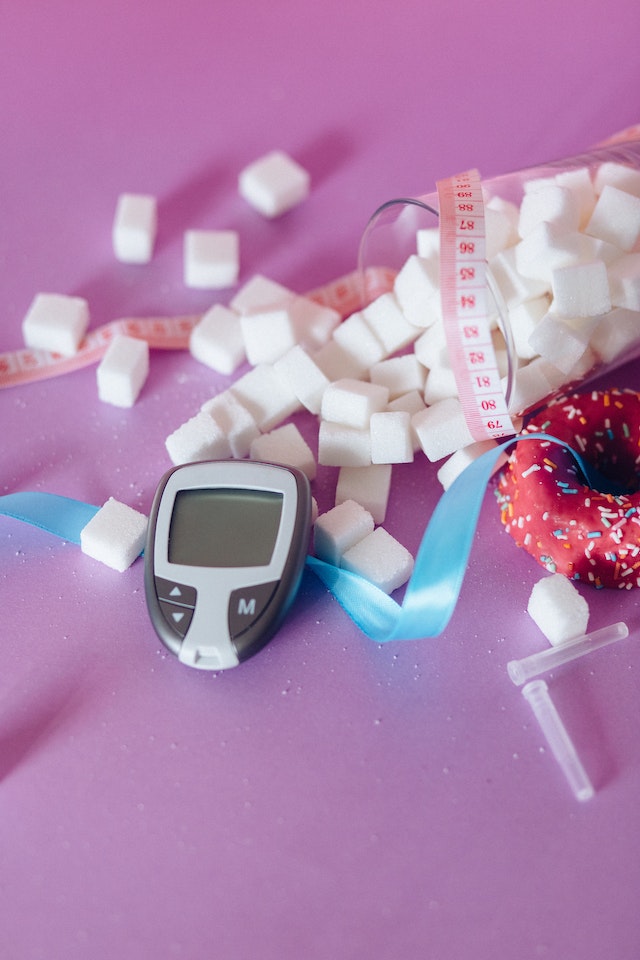5 Ways to reduce added sugar in the diet

it's crucial to cut back on sugar consumption.
Even if they are aware that consuming too much sugar might make them unwell, some people find it difficult to break the habit of eating sweets. Obesity, diabetes, and heart disease are a few of the health issues that may be brought on by excessive sugar consumption. So, it’s crucial to cut back on sugar consumption.

Through the following principles, we’ll try to assist you in choosing a balanced diet and reducing your sugar intake today:
Recognize hidden sugars.
Knowing which foods contain sugar is the first step in cutting back on your intake. There are hidden added sugars in many packaged goods. Learn the several names for sugar, including sucrose, maltose, and high-fructose corn syrup. You may choose by being aware of these sneaky sweets.
Limit sugary drinks.
Sugar consumption is influenced by sweetened drinks, which can cause weight gain and health issues. Replace these with fresh fruit and herbs, opt for whole foods, and cut back on processed meals for healthier options.
Choose whole foods.
In comparison to processed meals, these whole foods offer necessary nutrients and typically have less added sugar. Additionally, including a variety of whole foods in your diet can promote both weight management and general health. In comparison to processed meals, these whole foods offer vital nutrients and are less likely to cause weight gain and health problems. Additionally, including a range of whole foods in your diet helps support the maintenance of a well-balanced and nutrient-dense diet.
Prepare meals at home:
Eating out or relying on pre-packed food may be convenient, but often it is not good for our health. Restaurants often add sugar to their dishes or processed foods. By preparing food at home, you have control over the ingredients you use, and you can prepare your food at your convenience, which is not only healthy but also tastes good.
Eat smart:
Snacking, especially if you choose sweet snacks like cookies, candies, or chocolate bars, can lead to an excessive sugar intake. Instead, go for sugar-free, nutritious snack alternatives. Excellent choices include homemade energy balls, fresh fruit, raw almonds, yogurt, veggie sticks with hummus, and raw nuts.
What happens to your body when you decrease your sugar intake?
Consuming prepared meals and drinks with more sugar might cause weight gain and chronic diseases like diabetes. Limit extra sugars to whole fruits or healthy alternatives, and use moderate amounts of natural sweeteners. Because they include fiber and other beneficial components, fruits are a healthier choice. Also, fruits offer vital nutrients, including vitamins and minerals, that are good for your health. To maintain a balanced diet and lower the risk of acquiring chronic illnesses, whole fruits should always be preferred to processed meals or sugary snacks.
Consuming entire fruits also offers important vitamins and minerals that are good for health. Natural sweeteners like honey or maple syrup should be used because they still add calories to the diet. By making these decisions, people may take advantage of fruits’ sweetness while still eating a balanced diet that is rich in nutrients.
Men: 150 calories per day (37.5 grams or 9 teaspoons)
Women: 100 calories per day (25 grams or 6 teaspoons)
Added sugar is one of the worst ingredients in the modern diet. It provides empty calories without any added nutrients and leads to many health problems.
Major sources of added sugars are regular soft drinks, candy, cakes, cookies, pies, and processed fruit drinks. However, other foods have added sugar.
Prevents energy deficiency:
Eating too much sugar can decrease energy, making you tired and irritable. Consuming large amounts of any type of sugar increases energy levels in proportion to the amount consumed. But this soon results in a sharp drop in energy levels.
Sugar breaks down very quickly and causes a rise in blood sugar levels. During this time, the brain stops producing orexin, the neuropeptide responsible for feeling alert.
Excess dietary sugar affects the brain, nerves, digestive system, and muscles. If the body is not getting proper nutrition, it results in tiredness and fatigue.
Instead of going for a sugary drink or sugary dessert, opt for a protein-rich snack to keep you alert and full of energy.
Helpful in weight loss:
Sugar is just empty calories that you are eating and causes weight gain. When you eat excess sugar, your body converts only as much of it as it needs into energy and stores the rest as body fat. Eventually, this fat starts appearing on your waist, hips, thighs, and face.
Giving up sugar can ultimately help you lose a few extra pounds and prevent the health problems that come with being overweight. You may crave more sugar in the beginning, but over time, you will experience less sugar.
Lowers your risk of diabetes:
Excessive sugar consumption leads to fatty deposits around the liver, which over time contribute to insulin resistance by affecting the functioning of the pancreas.
Since sugar consumption is probably a major cause of diabetes, people who are at high risk of developing it in the coming years may greatly benefit from avoiding sugar altogether.
Improves oral health:
High sugar intake and poor oral health go hand in hand. When a high sugar intake is combined with poor oral hygiene, the results can be devastating.
There are hundreds of bacteria inside the mouth, many of which are beneficial. However, some bacteria feed on sugars and create acids.
Acids can destroy tooth enamel, which is the shiny, protective outer layer of the tooth. This in turn can lead to cavities, which, if not treated in time, can lead to severe tooth pain and possible tooth loss.
Limit your sugar intake if you don’t want to suffer from tooth decay, tooth loss, or other poor oral health problems.
Promotes good sleep:
Reducing sugar can help maintain blood sugar levels and also increase serotonin levels within the brain, promoting healthy and consistent sleep patterns.
Eating sugary foods causes blood sugar spikes, which leads to adrenal exhaustion. This affects the quality of sleep.
Additionally, sugar suppresses the activity of orexin, a neurotransmitter produced in the brain that helps regulate arousal, wakefulness, and appetite. High sugar leads to large amounts of glucose in the bloodstream, which suppresses the activity of orexin neurons in the brain.
Try eliminating sugar from your diet, or at least limiting your intake, to enjoy better sleep. You may be surprised at how much better sleep you’re getting!
Lowers blood pressure and cholesterol levels:
Giving up sugar means a healthy heart. It may help reduce your blood pressure and cholesterol levels. High sugar intake increases insulin levels, which activates the sympathetic nervous system. This increases blood pressure and heart rate.
High blood pressure makes your heart and arteries work harder, which gradually damages the entire circulatory system. Ultimately, this increases the risk of heart disease, heart attacks, strokes, and other serious coronary conditions.
After giving up sugar, you may see a significant reduction in low-density lipoproteins (LDL or ‘bad’ cholesterol) as well as triglycerides. Additionally, your blood pressure levels may come back on track.
Foods That Can Help Fight Sugar Cravings
What is a sugar craving?
Most people have the desire to eat sugar after eating food. This desire to eat sugar is called a sugar craving. Sugar cravings indicate that the body needs more energy and carbs.
When does SUGER CRAVING OCCURE?
When there is stress in the body, cortisol and adrenaline hormones start being produced in excess. Both of these create an imbalance in our body, in which we start craving sweets.
WHAT TO EAT DURING SUGAR CRAVING;
Raisins:
Whenever you have sugar cravings, you can consume raisins. Raisins are not only tasty to eat but also give instant energy. Raisins are also considered very good for the heart.
Dates:
Dates are good sources of magnesium, selenium, copper, and manganese. Its scientific name is Phoenix dactylifera. The soluble fiber present in it helps fight sugar cravings.
Honey:
Honey contains essential minerals like calcium, magnesium, and potassium, which are very effective in satisfying sugar cravings. Honey is also rich in helpful bacteria that help with digestion.
Dark Chocolate:
Many health experts recommend eating dark chocolate when you have sugar cravings. The biggest reason for this is that the amount of sugar in dark chocolate is lower. Dark chocolate contains flavonols.
BERRIES:
Berries contain fiber, vitamin C, and antioxidant polyphenols, which can instantly control sugar cravings. Consuming berries regularly reduces the risk of heart disease.
CINNAMON:
Cinnamon has antioxidant, anti-inflammatory, and bacterial properties, which help in controlling blood sugar levels. When you have sugar cravings, you can make cinnamon tea and drink it.
GREEK YOGURT:
Greek yogurt has a very low glycemic index, which helps in controlling blood sugar levels. This is also one of the reasons why people prefer to eat Greek yogurt instead of sweets when they have sugar cravings.
CHIA SEEDS
Vitamin C, Vitamin E, niacin, thiamine, antioxidants, and riboflavin are found in chia seeds, which are very effective in satisfying sugar cravings.
Conclusion
In conclusion, reducing your sugar intake is a crucial step in maintaining good health and well-being. Excessive sugar consumption has been linked to various health issues, including obesity, diabetes, heart disease, and even fatigue. By following the principles outlined in this article, such as recognizing hidden sugars, limiting sugary drinks, choosing whole foods, preparing meals at home, and making smart snacking choices, you can significantly decrease your sugar intake and enjoy the numerous benefits that come with it.
What are your personal strategies for reducing sugar in your diet, and have you experienced any noticeable health improvements as a result? Share your insights and tips in the comments below to inspire and help others on their journey to a healthier, lower-sugar lifestyle!
![]()





